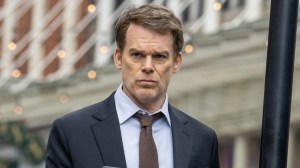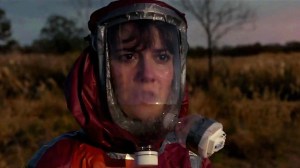Riverdale went back to the 1950s in its Season 7 premiere and it’s a whole new era for the series — literally. The season premiere not only delivered some brand-new dynamics for the series’ familiar characters, some iconic looks, and some interesting plot twists, but the episode also started to lay the groundwork for the big challenge of the season. Much of that challenge hinges on the era itself and this week’s “Don’t Worry Darling” highlighted that by centering on a surprising historic event — and now showrunner Roberto Aguirre-Sacasa is opening up about why it was so important to explore.
Videos by ComicBook.com
Warning: spoilers for the Season 7 premiere of Riverdale, “Don’t Worry Darling” beyond this point.
Early in the episode, “Don’t Worry Darling” reveals that Riverdale is reeling from a major event — the death of actor James Dean — but that there’s another major incident that is also heavy on the minds of some in the Town With Pep. That event? The murder of Emmett Till and the unjust acquittal of the men responsible for it, With Riverdale High having only recently become integrated, Till’s murder is, in the Riverdale timeline, even more an important issue and it’s one that Aguirre-Sacasa told ComicBook.com stemmed from examining how the various characters in the series would experience the era, one where things were certainly not equal for everyone.
“When we first started talking about the 1950s, I think the biggest conversations that we had in the writers room and that I had with various cast members were, and you yourself had even talked about, was is this going to be an idealized whitewashed 1950s where everyone was accepted and where it was okay to be gay, and it was the same being a black teenager as it was being a Caucasian teenager? And very quickly it was sort of like, ‘No, that’s not right, because that’s not true.’ And that’s just not the struggle that people were going through at the time,” he said. “And if you remember, in our season finale at the end of season six, when Archie and Jughead went back in time after the comet, which was so long ago, Archie comes downstairs and his mother says, ‘Something terrible happened. James Dean died.’ And James Dean represented a certain kind of American youth, like handsome movie star, and it was a national tragedy.”
He continued, “And when we were researching the 1950s, and specifically 1955, it was within weeks of James Dean’s death, it was the trial of Emmett Till’s murderers who of course were acquitted and set free. And it felt to us in the writers … when we were talking about it, wow, two different tragedies, two very different teenagers, covered completely different by the media, meaning completely different things. And it felt like a way to immediately dive into the thematics that we wanted to explore is by telling what we hoped was a meaningful sensitive story about Riverdale High being recently integrated, and what the black characters at Riverdale High would be feeling on the other side of that verdict coming down. Of course. And that felt like it was around that time period. And we talked about it a lot in the rooms, and Tabitha Tate, who is a character who’s always … and Toni Topaz, who has always … they’ve always been proud and political, and I don’t want to say social justice warriors, but they’ve always been concerned with those themes. It felt like it would be strange for them not to be talking about that and to have an episode where everyone’s just talking about James Dean. It felt that in our world if Riverdale High had recently integrated and this had happened, these are the kinds of conversations that some of our characters would have and that all of our characters should be having.”
This approach also helped center the idea that the real conflict of the season, the real villain that the characters are facing is the 1950s and society at large itself.
“Usually, when we talk about the season, when we’re planning the season, we usually have a big bad or a villain that all of the kids are at some point or other engaging with and fighting against. And in season six, it was Percival Pickens who was an intergalactic time-traveling sorcerer. But when we were talking about this season, we really felt like the villain or what they were fighting against society was the 1950s,” he said. “And that the conflict that all of our characters to some extent or other were caught up in was, how do we live honest, authentic lives that are individualistic and that allows us to be exactly who we want to be in a society that represses that and that demands conformity and that punishes anyone who falls outside of the carefully constructed mores of the 1950s, the institutions of the ’50s celebrated, which is to say via traditional American family, traditional American gender roles, traditional … a social order that has since been exploded and broken down and rebuilt time and time again since that time? So, it felt like the villain, if there was one, were the 1950s. And by the way, we have characters that symbolize that… but the big conflict was with society at large and them sort of bristling against that.”
Riverdale airs Wednesdays at 9/8c on The CW.








